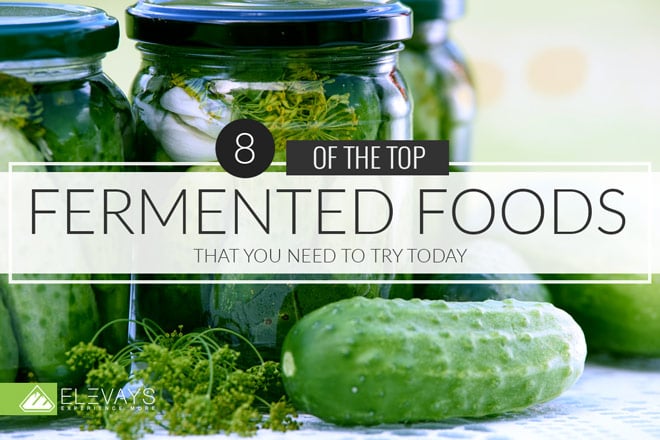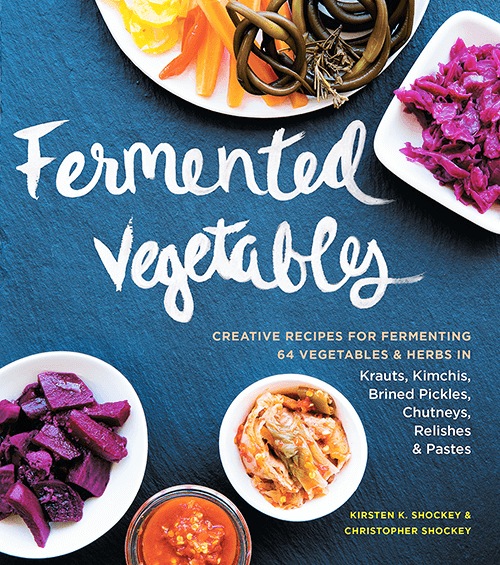
If I say the word “fermented” and your brain goes straight to wine, you’re not alone. Our food culture – even some of the health community – has virtually ignored all things fermented (other than a glass of cab, of course). So blueberries enhanced through lacto fermentation is a foreign concept to most people.
But it shouldn’t be.
TRUTH BOMB:
You’re
Already killing it!
If You Were More Consistent With Your Wellness Routine, You’d Be Unstoppable.
Fermented foods are a delicious gateway to pure health.
Through the scientific process of lacto fermentation (which we will dive into in just a moment), vegetables, fruits, and even drinks can be infused with probiotics, enzymes, and other essential nutrients.
So let’s see exactly how this lacto fermentation works and why the probiotics it creates are so important. Then I’ll go over 8 fermented foods you can try today.
What Is Fermentation?
Fermented foods have been through the lacto fermentation process. What’s that, you ask? I’ll tell you.
Lacto fermentation is the process in which natural bacteria already present in the food feeds on starch and sugar to create lactic acid.
This process can preserve the food and develop:
- Crucial enzymes
- Omega-3 fatty acids
- B-vitamins
- Probiotics (those good, friendly bacteria necessary for a healthy gut)
Fermentation can preserve food nutrients and even make them more digestible. This easy digestion combined with the high count of probiotics is why fermented foods are extremely important for your gut – and basically every other bodily function.
And don’t think lacto fermentation is just some new hipster fad.
For many years, people around the world knew the significance of having fermented foods.
From Germany’s favorite sauerkraut to Korea’s favorite kimchi, fermented foods have been an integral part of the world’s diet.
And researchers have come alongside these traditional uses by proving there is a definite link between the overall well being of the human body and the foods that are rich in probiotics.
Why Probiotics Matter
The star of fermented foods is undoubtedly probiotics. But why do they even matter?
It’s all about your gut, really.
Your gut does so much more than simply digest your food. It is essentially a second control center for your body (the other being your brain). The vast majority of your immune system resides in your gut.
So when your gut isn’t happy… none of your body’s systems are happy.
In order to get a healthy gut you need a properly balanced gut flora, AKA: the trillions of living organisms that reside in your digestive system.
In your gut flora there can be bad bacteria and good bacteria. You probably already realize this, but you want the good kind – lots of it, in fact.
And that’s exactly what probiotics are. They are good, friendly, helpful, supportive bacteria that give you a healthy gut. And when you have a healthy gut, you can also have healthy skin, healthy lungs, a healthy mind, a healthy immune system, etc.
8 Great Fermented Foods To Try Today
Whether you are brand new to fermented foods, or hoping to branch out and try some new ones, here are 8 foods that give you the rich benefits of lacto fermentation.
You will find some common threads here. Yes, many of these foods are on the sour side. Many of them may not be part of your go-to shopping list. But they are all versatile and delicious.
-
Kombucha
Kombucha is all the rage these days, popping up in every cute cafe and health food store around. Just because it is trendy doesn’t mean it is all hype (thank goodness!)
Kombucha starts out as black tea and a bit of sugar prepared from different sources like honey, fruit, and sugarcane.
There are many health benefits of drinking kombucha. The drink contains a variety of yeast and bacteria that are necessary for your health. After the process of lacto fermentation, the Kombucha has enzymes, probiotics, B-vitamins, and high concentration of lactic, gluconic, and acetic acids.
Enjoying kombucha regularly can boost your energy, provide relief from joint pain and even support weight loss.
Added bonus: lacto fermentation makes Kombucha fizzy. Which means it’s a fabulous alternative to soda.
But, fair warning: The biggest challenge with store bought kombucha is to make sure that it is low in sugar. There’s many high sugar versions of kombucha on the market and it could sabotage the health benefits. So, read the label, choose low sugar brands (4 to 5 grams or less per 8 oz.) and choose carefully.
It may be important to mention that the lacto fermentation process will leave you with a slightly alcoholic tea. Though the percentages are small enough that they can be sold in stores without an ID, anyone completely avoiding alcohol may want to try some other fermented treats below.
-
Yogurt
Without a doubt, yogurt is our culture’s #1 go-to when it comes to getting live probiotics. And while it is true that yogurt is a fermented food filled with these important live bacteria, most yogurt options on the store shelves are anything but healthful.
You’ve got sky-high sugar or fake chemical sugars. You’ve got additives and fillers. You’ve got bad fats. And most likely you have milk from grain-fed cows exposed to way too many antibiotics.
All this to say, if you want to eat yogurt for its health benefits either make it yourself or become a label-reading detective.
You want yogurts that:
- Are low in sugar, and only sweetened with real sugar sources – better yet, have no sugar added (you can drop some berries, raw honey and nuts in there for flavor)
- Come from organic grass-fed cows if choosing to eat a dairy variety
- Have no artificial ingredients whatsoever
If you are not a dairy eater, you can try coconut yogurt from fermented coconut meat. It’s both a delicious and healthy choice.
Once you find one of these top-notch yogurts, you can enjoy the benefits of the probiotics safely.
-
Kefir
Kefir is essentially a runny yogurt great for drinking.
Traditionally, it is a fermented milk product obtained using a lactobacilli bacterial culture. But if you avoid dairy, you do not have to avoid kefir altogether.
You can find coconut kefir and even water kefir, both of which still have the same probiotic qualities as the dairy version.
There are several health benefits of drinking kefir as it contains large amounts of calcium, vitamin B12, vitamin K2, magnesium, probiotics, enzymes, folate, and biotin.
Health benefits from kefir’s lacto fermentation include (but are certainly not limited to):
- Boosting immunity
- Building bone density
- Improving digestion
- Improving your skin
Like the yogurt, make sure to choose an organic, low-sugar brand with only clean ingredients. One of my favorite recipes from fermentation enthusiast Emillie, is her easy-homemade milk kefir. It’s a must try.
-
Sauerkraut
Turns out that that your Reuben sandwich or your sauerkraut-covered hotdog could be the healthiest thing you ate all week (that is if you get rid of the processed meat… and the refined carbs…. and the saturated fats… basically, I’m just talking about the kraut!)
Sauerkraut is cabbage, which has gone through the lacto fermentation process. You are left with food rich in dietary fiber, vitamin K, vitamin C, Vitamin A, and vitamin B. It is also a wonderful source of calcium, copper, iron, magnesium and manganese.
There are numerous benefits of Sauerkraut including its ability to promote digestive health, fight inflammation, reduce cholesterol levels and strengthen bones.
Sauerkraut is normally widely available at most regular grocery stores. But in order to get the optimal amount of probiotics and other benefits, choose an organic brand in a glass jar.
Sauerkraut can be added to the side of virtually any savory meal. It adds great flavor to meats, veggies, potatoes, and even soups.
-
Pickles
Quick caveat: not every single pickle is fermented. Some are “pickled.” To ease the confusion, think of it this way:
- Fermented pickles are fermented in water and salt
- Pickled pickles are pickled in vinegar (say that 5 times fast!)
So why go for fermented pickles?
- Pickles have tons of minerals and vitamins, in addition to gut-friendly bacteria and antioxidants
- Pickles can single-handedly fight against the ever-so-common deficiency of vitamin K
- Just a small quantity of pickle contains 18% of your daily vitamins and the much-required fat-soluble vitamins, responsible for improving heart health and the strength of your bones
Were you one of those kids who tried to gross out their friends by drinking straight from the pickle jar? Turns out you simply had good health sense. Try a pickle juice for all the benefits it offers.
If you plan to purchase a bottle of pickles in a local store, choose the organic option. I would also recommend doing your homework to see if you can find a local pickle maker who uses lacto fermentation.
-
Kimchi
Kimchi is another one of those “trendy” foods popping up in hip eateries. Just this weekend, I found a taco stand serving kimchi tacos.
A traditional dish of Korea, kimchi is prepared with vegetables like cabbage and radishes with added seasonings like chili powder, ginger, and garlic. The spices give kimchi its memorable kick.
Outside of a high probiotic dose, you are looking at a wide variety of health benefits including antioxidants, immune system support, and lowered cholesterol.
Though it is tasty to eat on its own, one of the nice aspects of kimchi is its versatility. Other than tacos, it can taste delicious mixed into scrambled eggs or an omelet. You can put it on top of a sandwich or in a wrap. You can put it in a vegan or traditional quesadilla. Get creative with it!
-
Tempeh
If you have ever made a vegan recipe or eaten at a vegan restaurant, chances are you have come across tempeh before.
That’s because it has an insanely high amount of protein (a whopping 31 grams of protein per cup), which is a perfect addition to a plant-based diet.
Not only that, but tempeh’s cake-like texture is a great meat stand-in.
But the health benefits of this fermented food don’t stop there. Tempeh is a soybean product that is prepared by mixing together a tempeh starter (usually a mixture of live mold). When the mixture is left alone for a day or two, you get your cakey tempeh.
There are several probiotic benefits of tempeh once it has gone through lacto fermentation.
- It can support bone density
- It can control cholesterol and menopausal symptoms
- With the high amount of vitamins, this fermented food can also help you in building muscles and recovering from muscle injuries
Since this is soy based, make sure you find a brand that is using non-GMO soybeans.
-
Natto
Last up on our list of fermented foods is a dish you have most likely never heard of: natto. These fermented beans are a traditional Japanese breakfast, and they are undoubtedly unlike anything you have ever eaten…
…gooey, sticky, slimy, and smelly. (How could you not be excited to try it after all that?)
Set aside all judgments and come into natto with an open mind. It is a dearly beloved dish with fabulous health benefits.
These fermented soybeans have the immensely powerful bacillus subtilis that is probiotic in nature and known to support cardiovascular health and the immune system.
The benefits don’t end there, as Natto is known to support the digestion of vitamin K2. Natto contains nattokinase, a powerful enzyme that is anti-inflammatory in nature and can prevent the risk of cancer.
Since this is one of the more unfamiliar fermented foods on this list, many people may not be sure how to eat it. The website Japanese Cooking 101 does a great job at explaining the how you can make it into a lovely rice bowl.
You Can Ferment That…
All this lacto fermentation goodness does not stop just because the list is wrapped up. Lots of different foods can be fermented.
Essentially any vegetable and even many fruits can go through lacto fermentation. Some of my favorites include:
- Apple and Beetroot Relish
- Fermented Berries
- Fermented Jalapeños
- Fermented Green Tomatoes and Hot Peppers
- Fermented Ginger Ale
We also LOVE this book Fermented Vegetables by Kirsten and Christopher Shockey.
Most of all, be creative! Take advantage of the almighty Google and learn how to use lacto fermentation on your favorite veggie or fruit.
The benefit of being able to easily make such a variety of fermented foods is simply variety. Sauerkraut is delicious, but do you want it everyday? The more options you give yourself, the more likely fermented foods will continue to find themselves on your plate.
Getting Your Fermentation On
I started this article mentioning wine, so let me leave you talking about the same. Why did wine or beer not end up on the list?
While some studies show there could be probiotic qualities in wine, getting too much of the alcohol content could reverse the benefits.
So maybe stick to a kombucha/kefir in the day and one glass of red at night sort of plan.
Now back to our list of 8!
Does this all inspire you to add more fermented foods to your diet? Excellent!
Most of the foods I have recommended here are not only beneficial for health, but they are also tasty too. So, enrich your taste buds and get healthier in the process.
Please use the comment section below to let us know which of the fermented foods you like best. If you have your own recipe for lacto fermentation – share that too!

Sources:
https://authoritynutrition.com/9-health-benefits-of-kefir/
https://www.organicfacts.net/health-benefits/other/sauerkraut.html
http://food.ndtv.com/health/7-incredible-health-benefits-of-pickle-juice-drink-up-1440155
http://www.culturesforhealth.com/learn/recipe/lacto-fermentation-recipes/lacto-fermented-kosher-dill-pickles/
http://www.japanesecooking101.com/natto-recipe/
https://www.globalhealingcenter.com/natural-health/the-9-best-fermented-foods-for-your-gut/
http://nourishedkitchen.com
https://www.optibacprobiotics.co.uk/blog/2014/09/is-wine-a-probiotic






READ the Latest
Health Habits
Longevity
Health Habits
Health Habits
2 Comments